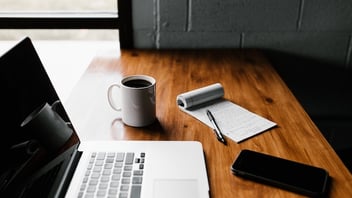-
 Blog
Blog
-
 Life in the Pandemic at CQSE
Life in the Pandemic at CQSE

It's the end of spring in 2021, the sun is coming out and it's starting to look like this will be the year where we can finally start beating back the COVID-19 pandemic in earnest. However, there is still a stretch of time we need to get over until regular life may hopefully resume, so I wanted to share with you how we are dealing with the pandemic at the company where I work, CQSE.
Even before the pandemic, remote work had become an increasingly important factor in work life at CQSE, as we began hiring people who didn't live in the vicinity of our Munich headquarters. Other employees had been moving away from Munich to live closer to their families, and others still were happy to follow our company's expansion into California, USA. All of this is to say that we were already well into establishing a remote company identity, and COVID merely sped the process along. As a concrete example, remote-only meetings are now our default (and will probably stay that way), which wouldn’t have happened that quickly without the pandemic.
Some of our established work practices already disposed us towards effective remote work. For example, we use laptops rather than desktop machines for work, which are kept up-to-date and renewed every 3-4 years. Even in the office, we routinely log into the same VPN we use remotely. As a consequence, our working environment remains the same regardless of the desk where we use it. This facilitates seamless transitions from local work to remote work.
However, quite early on in the pandemic we found that this unique situation warranted an additional, more focused response. Most of the CQSE employees were working remotely at this point, and we felt that something had to be done to give people a sense of belonging to a shared culture, rather than toiling away on their own. To this end, we established a number of new social formats. One such format is the (by now very warmly regarded) weekly recurring "CQTalk", which consists of presentations and discussions with the entire company as the target audience. The topics range between the technical (such as an "Introduction to React"), the interactive ("What are your personal remote work best practices?") and the organizational (such as a recent presentation on our internal Teamscale development process). We also have the occasional invited talk, most recently one about AI design patterns by Stefan Bordag.
Naturally, we also invested heavily in proper remote working hardware. When virtual meetings are all you have, you better make sure that these work as flawlessly as you can make them! This meant that all employees received high-quality webcams and audio devices. The specific models were chosen by the employees on their own (as are their laptops by the way, since we are big believers in the philosophy that everybody knows best how they can work most effectively), but we provided a Wiki page with recommended models as a starting point. Additionally, employees received a one-time payout intended to help with the purchase of an ergonomic home working environment (i.e., appropriate chair and desk).
Some of our existing practices seemed to clash with remote work more severely than others, for example our "institutionalized" coffee breaks at 10am and 3pm, which are always a welcome opportunity to socialize with colleagues (since everybody uses them to take a break at the same time). However, after some experimentation we found that virtual coffee breaks seemed to work reasonably well as a substitute. For this, we use a regularly scheduled Google Meet (attendance is of course optional!). For larger groups, we sometimes use Gather Town (since groups can spread out there naturally and discuss different topics as they like). One of my colleagues even went so far as to model our Munich HQ in Gather Town, which felt surprisingly nostalgic to some of us after being sequestered in our own homes for so long.
Another social format we introduced was the "1:1 Coffee Break". This was designed as an alternative to the regular group coffee breaks, where multiple participants meet up to discuss whatever is on their minds at the moment. While this is a good format most of the time, once in a while it's also nice to have an in-depth conversation with a single person. Even though everyone is free to schedule such 1:1 talks with their colleagues at any time, people tended to do this mostly with their closer colleagues. We had the idea to facilitate a bit more social intermingling, so you would talk to people from other teams as well as the ones you were seeing on a regular basis anyway. As software engineers, naturally we developed a bit of code around this idea. Our open-source Break Roulette Generator remembers a history of your latest coffee break partners and makes suggestions based on whom you haven't talked to for a while. As an added twist, it performs a global optimization over the whole company to ensure that nobody remains without a fresh face to talk to for weeks on end.
Of course, none of these measures can fully replace the regular face-to-face interaction you get in the workplace, and all of us are very much looking forward to seeing our colleagues again on a more regular basis. That said, we still feel that all of these small changes added up to make the remote-only period significantly more enjoyable. It will also be interesting to see what the new "normal" will look like in a world where many companies have been forced to adopt a "remote first" approach, if only temporarily.
What are your experiences with the pandemic? How has it affected your working life? Have you tried out similar measures in your company? I would be interested to hear from you on Twitter.
Related Posts
Our latest related blog posts.
